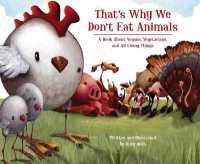Full Description
This book seeks to deepen empirical understandings of herder-farmer conflicts in Africa from the perspective of peacebuilding. Thus, the focus of the book is on the manifestations, causes, consequences and management of these conflicts (responses) by both state and non-state actors and lessons for sustainable peacebuilding.
By adopting a comparative approach spanning five countries (Burkina Faso, Cameroon, Nigeria, Sudan and Togo), our study seeks not only to fill the gap, but also expand the frontier of knowledge on the subject, exploring important cross-cutting issues such as human rights, rule of law, gender and youth. The interconnections between these conflicts and security, safety and development at all levels underscore the urgency and pertinence of this study.
Contents
SECTION I: BACKGROUND AND THEORETICAL PERSPECTIVES.- Chapter 1: Introduction: Dynamics of Herder-Farmer Conflicts in Africa.- Chapter 2: Peacebuilding Perspectives and Herder-Farmer Conflicts in Africa.- SECTION II: CASE STUDIES.- Chapter 3: Natural Resource Scarcity and its Implication for Farmer-Herder Conflicts in Burkina Faso.- Chapter 4: Managing Herders-Farmers Conflicts in Donga Mantung Division of the North West Region of Cameroon.- Chapter 5: Incidents of Farmers-Herders' Conflicts in Benue State, Nigeria.- Chapter 6: Understanding Herder-farmer conflicts in Nasarawa State, Nigeria.- Chapter 7: Women in the Shadow of the Conflict in the Farming and Herding Communities in Plateau State, Nigeria.- Chapter 8: Considering Gender Issues in Farmer-Herder Conflict Resolution in Darfur Region, Sudan.- Chapter 9: Herders-Farmers Conflicts in Togo.- SECTION 3: CONCLUDING REFLECTIONS.- Chapter 10: Conclusion: Matters Arising in Herder-Farmer Conflicts and Lessons for Sustainable Security, Development and Peacebuilding.







